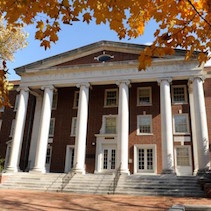 Vanderbilt University in Nashville, Tennessee, has announced that it will remove the inscription “Confederate Memorial Hall” from the facade of a campus building. The building opened in 1935 and originally was used as a dormitory for women studying to be teachers. Its construction was partially financed by a donation from the United Daughters of the Confederacy. While the university had referred to the building as “Memorial Hall,” the inscription “Confederate Memorial Hall” remained on the building under the terms of the original donation. The inscription has been a symbol of exclusion and divisiveness for many years, according to university officials.
Vanderbilt University in Nashville, Tennessee, has announced that it will remove the inscription “Confederate Memorial Hall” from the facade of a campus building. The building opened in 1935 and originally was used as a dormitory for women studying to be teachers. Its construction was partially financed by a donation from the United Daughters of the Confederacy. While the university had referred to the building as “Memorial Hall,” the inscription “Confederate Memorial Hall” remained on the building under the terms of the original donation. The inscription has been a symbol of exclusion and divisiveness for many years, according to university officials.
Now, the university, with permission of the Tennessee Court of Appeals, will return the original donation to the United Daughters of the Confederacy along with a return on investment of the funds from 1933 to the present. The bottom line is that the university is paying the United Daughters of the Confederacy $1.2 million to remove the inscription from the building. The university notes that the funds to make the payment to the United Daughters of the Confederacy were raised from private donations expressly for this purpose.
Nicholas S. Zeppos, chancellor of Vanderbilt University, stated that “many generations of students, faculty, and staff have struggled with, argued about, and debated with vigor this hall. We have asked time and again how can we have this symbol in the sky—a pediment is intended to draw a gaze upward—as part of our aspirational goals? Our debates and discussions have consistently returned over these many years to the same core question: can we continue to strive for that diverse and inclusive community where we educate the leaders that our communities, nation and world so desperately need, with this hall as so created? My view, like that of so many in the past, and so many in our present, is that we cannot.”
You can read Chancellor Zeppos entire statement on the issue here.










Congratulations to Vanderbilt University for taking a very positive step in the right direction. It sends a message the words matter.
One woud hope that the daughters of the daughters of the Daughters of the Confederacy would have gotten it enough to ask that the name be removed and have Vanderbilt keep the money and establish a grant program for young women of African American descent, or with a southern heritage and they be the beneficiaries of the one and one half million. The black families and poor white families trampled on by the establishment of the Confederacy, could be partiallay “repaid” for their loss.
It also occurs to me that if the war ended in 1865, and I know the building mAy have been in progress a bit after that, why was it ever named CONFEDERFATE.